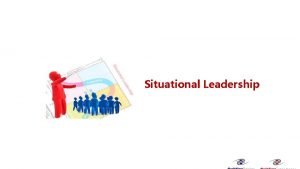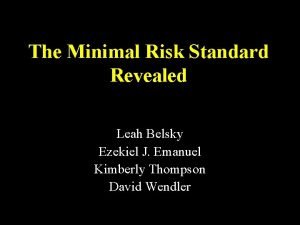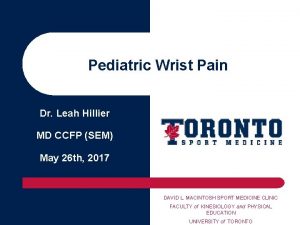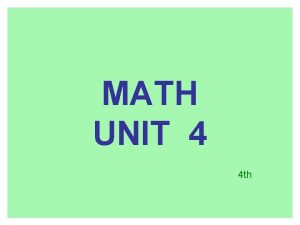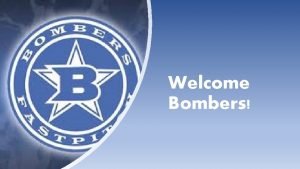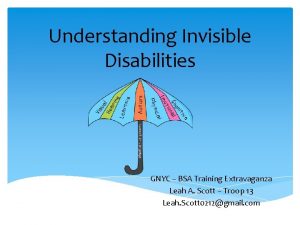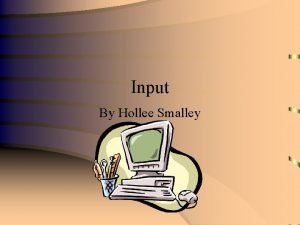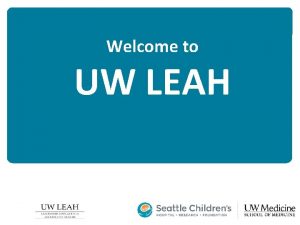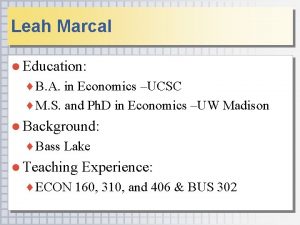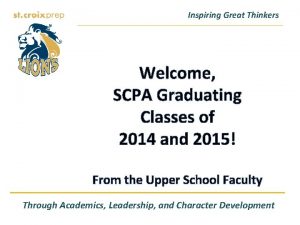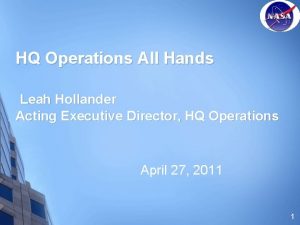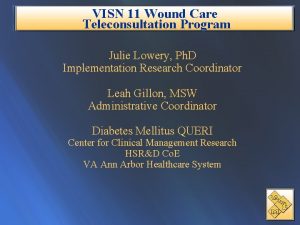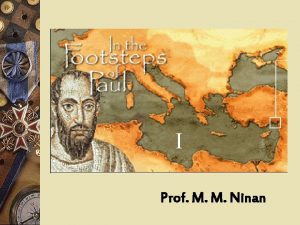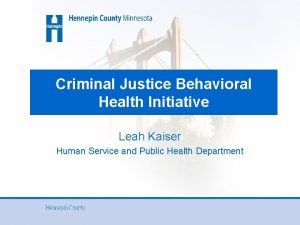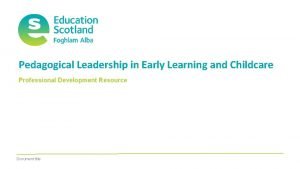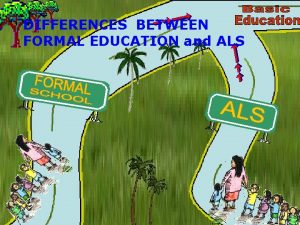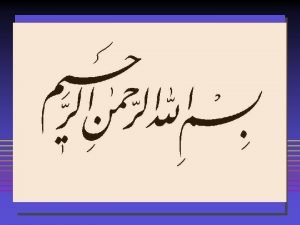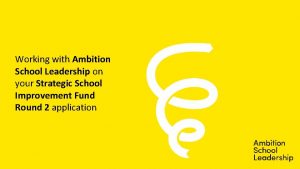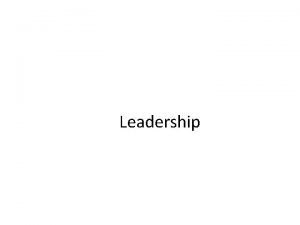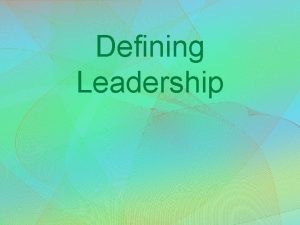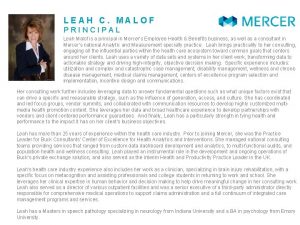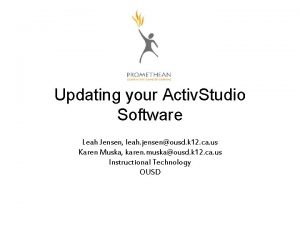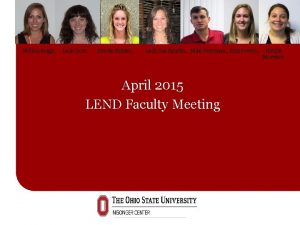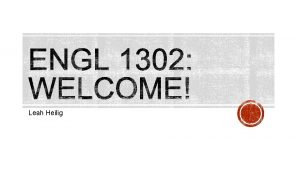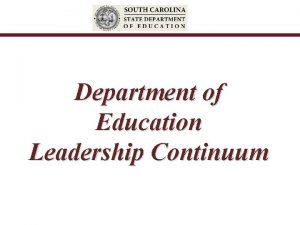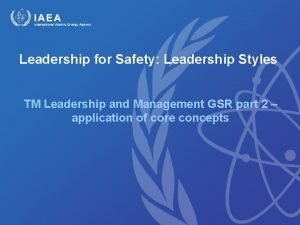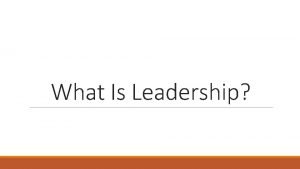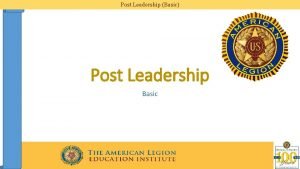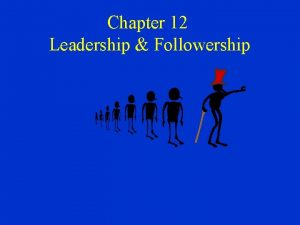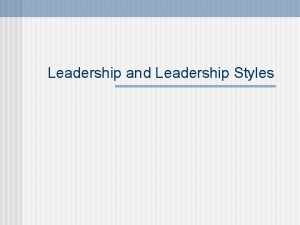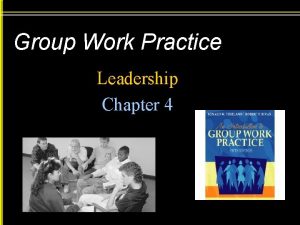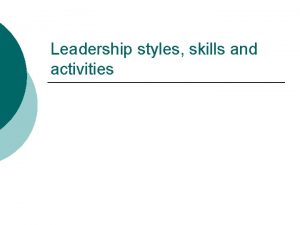UW LEAH WHAT IS LEAH Leadership Education in






































- Slides: 38

UW LEAH

WHAT IS LEAH? • Leadership Education in Adolescent Health (LEAH) • LEAH training prepares graduate level health professionals for national, regional and local leadership roles in adolescent health • Funded by the Maternal Child Health Bureau (MCHB)

UW LEAH is one of 7 LEAH Programs in the United States • • MASSACHUSETTS REGION I MARYLAND REGION III ALABAMA REGION IV MINNESOTA REGION V INDIANA REGION V CALIFORNIA REGION IX WASHINGTON REGION X

History of the LEAH at UW • Bob Deisher 1959 – 1 st Adolescent Clinic west of the Mississippi • 1970 s UW was one of the early multidisciplinary AHTP programs at the UW CHDD • 1977: AHTP▬►LEAH till 1998 • July, 2012 – UW LEAH awarded

Adolescent Services Missing Opportunities Institute of Medicine : 2008 • Competencies in adolescent health care in provider training & certification • Expand sustain interdisciplinary training programs • Diverse Leaders • Specialists • Scholars • Educators • 2009 LEAH programs meeting at NAS

2012 UW LEAH: Goals and Objectives • To engage develop and support leaders in Adolescent Health across 5 core MCH disciplines • To develop innovative approaches to leadership training and research to improve adolescent health, locally, regionally, and nationally

More Goals and Objectives • To prepare and support MCH leaders to promote health equity, wellness and reduce disparities in health and healthcare • Network in the region and nationally to promote awareness of adolescent health issues • Provide continuing education to Title V agencies and MCH programs

Who are LEAH Fellows? • Trainees represent a variety of disciplines • Five Key Disciplines: Medicine, Nutrition, Psychology, Nursing, Social Work • YOU were selected because you have demonstrated leadership qualities • LEAH graduates are expected to take leadership roles in the clinical, academic, public health, and policy arenas

Who are LEAH Faculty? • Leaders in each of the key disciplines • We share a commitment to: • Adolescent Health • Multidisciplinary care • Education of new leaders in the field • We are also educators, researchers, clinicians, and advocates

Introductions: LEAH Fellows and Faculty 2013 Trainees: • • • Annie Hoopes (Medicine) Ellen Selkie (Medicine) Brandi Shah (Medicine) Michaela Voss (Medicine) Elizabeth Walsh (Soc. Wk) Erin Harrop ( Soc. Wk) Jennie Brown ( RN) Katie Verriere ( RN) Mya Kwon ( Nut) Alexandra Kauffman ( Nut) Annie Tao ( Psych) Core Faculty: • Medicine: Leslie Walker & Laura Richardson • • Nursing: Janet Cady & Andrea Landis Nutrition: Alicia Dixon Docter Psychology: Cari Mc. Carty Social Work: Rico Catalano & Erik Schlocker

FACULTY INTRODUCTIONS MCH LIFE COURSE PRESENTATIONS

BREAK & PHOTO Photo Order 1. 2. 3. 4. 5. 6. 7. 8. 9. Fellow & Faculty Group Photo Fellow Group Photo Alexandra Kaufman Mya Kwon Jen Brown Katie Verriere Annie Tao Erin Harrop Elizabeth Walsh

LEAH Orientation: Part II Getting the Most out of Your LEAH Training September 13, 2013 UW LEAH Orientation

UW LEAH: Overview of Training Activities • Curriculum includes: • Clinical training • Didactic training • Community leadership • Regular assessments & tracking: • Individualized Training Plan • Competencies Self-Assessments • Med. Hub

Clinical Training • Rotations are arranged with your discipline lead and ideally count towards both the LEAH and other training • 150 hours of clinical training • Primary training site: 100 hours (direct care) • At least 2 other sites: 50 hours (direct or observation, minimum of 4 half-days per training at each site) • One site must be the Springbrook AYA Clinic • All trainees must shadow providers from each of the other disciplines (count as “secondary sites”)

Didactic Instruction • UW LEAH Core Seminar Series • Fridays 1: 15 -3: 30 pm • Clinical Case Conference/Journal Club • Fridays 12: 15 -1: 00 pm • UW MCH Leadership Series • Mondays 11: 30 am-1: 00 pm (~monthly) • Adolescent 411 • First Wednesday of the month 8: 00 -11: 00 am • Web-based Training & Reading Assignments

Community Leadership • All trainees are expected to complete a leadership project (to be discussed) • Also encouraged to be engaged in other community leadership activities including: • • Research Advocacy Community involvement Technical assistance • Specific additional projects should be discussed with individual mentors

Individualized Training Plan • Used to track activities and achievements • Responsibility of the fellow to keep updated • Develop and review with discipline lead mentor at least 3 times per year: • October 2013 • January 2014 • April 2014

Individualized Training Plan • Areas covered: • • Mastery of MCH Leadership Competencies Knowledge and Skill in Adolescent Health Interdisciplinary Team Skills Knowledge of Life Course, Social and Other Determinants of Health in Adolescents Skills in Adolescent-Centered, Family Involved Care Research Skills and Knowledge Public Health and Title V Legislation Knowledge & Application Utilization of Health Technology


Basic Competencies Self-Assessment • Based on MCH leadership competencies • Twelve general areas with specific competencies • Basic and advanced (two forms) • Measured by self-assessment and discussed with discipline lead mentor: • October 2013 • January 2014 • April 2014

MCH Leadership Competencies

Med Hub • Tracking system for evaluations and (if desired) portfolios. • Further review by Katie Albertson, program coordinator

Cari Mc. Carty 2013 -2014 Leadership Project Overview September 11, 2013 UW LEAH Orientation

Categories for Leadership Projects • • • Clinical Care Policy Research Advocacy Education

Leadership Projects Should • Address an adolescent health issue • Include a discussion on how the project is relevant to diverse & underserved populations, health equity or addressing disparities

Format for Leadership Project • Power Point Presentation • Poster Presentation • Written Manuscript

Mentoring Panel • At least 2 faculty mentors who will meet with you to advise you on the development of your project (yes, you can have more) • Mentors must come from at least 2 different disciplines

Leadership Project Timeline Sept/Oct – Brainstorm ideas and consider mentorship options November – Form question/idea, methods, and background (literature search) December – Proposal draft due February – Mini-presentation of project idea Early May – Final check-in Late May/early June – Presentation Day

Potential Collaborative Projects • Testing an electronic health screener for adolescents • Collect cultural competence resources and evaluate their evidence-base • Increasing flu shot uptake in middle schools • Increasing HPV vaccinations

Potential Collaborative Projects • Teen sleep study • Work with youth advisory group on a topic of mutual interest • Guiding good choices at Eckstein • Community coalition to reduce substance use • Powerful Choices/Powerful voices groups at Atlantic Street Center

Potential Collaborative Projects • Teen Center Groups at New Holly • Homeless Youth Program at 45 th Street/Country Doctor • Qualitative Research with Transgender Youth • Nutrition education with school-based health clinics

Katie Albertson Fellow Expectations September 11, 2013 UW LEAH Orientation

Expectations • Seattle Children’s e-mail • Check once per weekday • Do not have to forward UW • Badge • Evaluations in Med. Hub • Attend all LEAH seminars • Sign in • Use microphone Use Catalyst Tools through My. UW. washington. edu for up-to-date versions of documents. In the future, this will be accessible through depts. washington. edu/uwleah.

Med. Hub & Evaluations To access evaluations: Go to uw. medhub. com + login with your UW Net. ID weblogin

UW LEAH Website WWW. DEPTS. WASHINGTON. EDU/UWLEAH v. Recorded & archived seminars v. Trainee & core faculty bios

Next Steps • Review your Case Conference and Committee assignments • Access your Seattle Children’s Hospital e-mail & set up Gemalto remote access (handbook) • Set up a meeting with your mentor for mid. October to review ITP & MCH Competencies. See you Friday, October 4 th for our first lecture!

Upcoming didactics 10/4 Trends in Adolescent Health and Overview of Issues in the Pacific Northwest Sabrina Oesterle & Josephine Ensign 10/11 MCH History – HRSA, Title V Carolyn Gleason Life Course Perspective Jerry Herting 10/18 10/25 Introduction to LEAH Leadership Project Cari Mc. Carty & Leslie Walker Defining Leadership in the MCH Field Laura Richardson Unerstanding Your Leadership Style Laura Richardson
 Transactional leadership
Transactional leadership Adaptive leadership theory
Adaptive leadership theory Enthusiastic beginner disillusioned learner
Enthusiastic beginner disillusioned learner Dr leah hollon
Dr leah hollon Leah belsky
Leah belsky Devorah leah
Devorah leah Leah yourstone
Leah yourstone Dr leah hillier
Dr leah hillier Devorah leah jensen
Devorah leah jensen Leah has 28 more marbles
Leah has 28 more marbles Leah kuragano
Leah kuragano Leah spontaneo
Leah spontaneo Mn bombers softball
Mn bombers softball Devorah leah jensen
Devorah leah jensen Leah kalish
Leah kalish Input devices for physically challenged users
Input devices for physically challenged users Vinput leah
Vinput leah Leah saperstein
Leah saperstein Uwmedhub
Uwmedhub Leah marcal
Leah marcal Triviuum
Triviuum Leah hollander
Leah hollander Leah old testament
Leah old testament Leah devine design
Leah devine design Visn 11
Visn 11 Leah ewing ross
Leah ewing ross Yo utub
Yo utub Leah rachel ninan
Leah rachel ninan Elena hollander
Elena hollander Leah saperstein
Leah saperstein Leah banks
Leah banks Leah devine design
Leah devine design Leah kaiser
Leah kaiser Scottish school system
Scottish school system Define blime
Define blime Als vs formal education
Als vs formal education Difference between health education and physical education
Difference between health education and physical education Backbone of extension education
Backbone of extension education Ambition school leadership
Ambition school leadership


